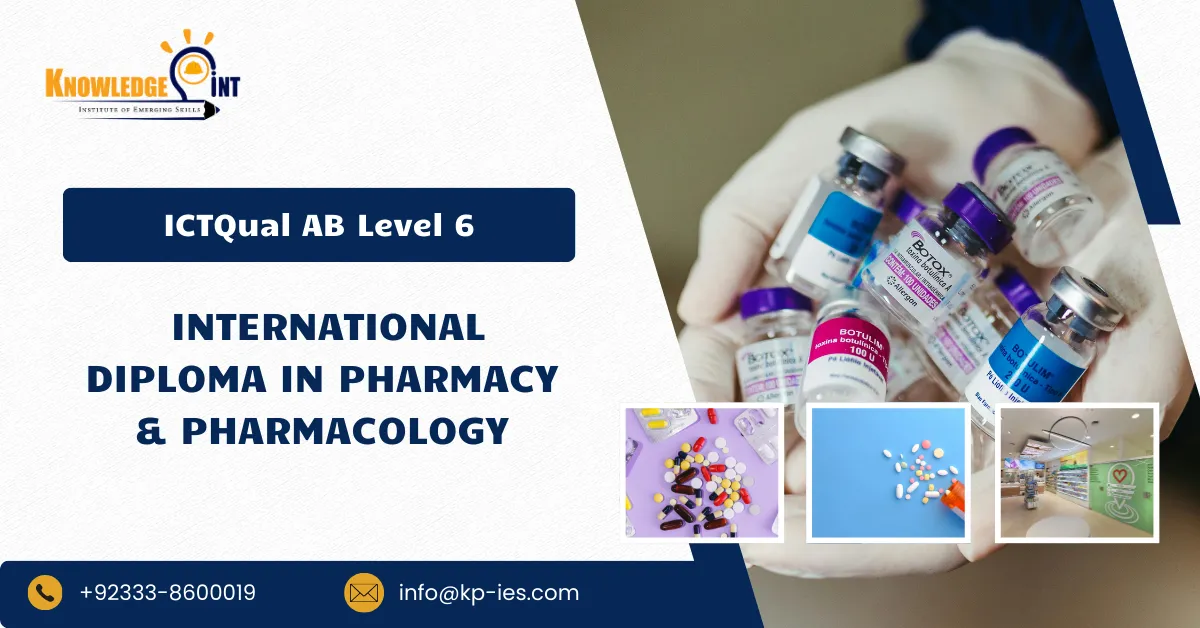The ICTQual AB Level 6 International Diploma in Pharmacy & Pharmacology is a structured three-year programme carrying 360 credits, designed for individuals seeking to build advanced expertise in the fields of pharmacy, drug development, and clinical pharmacology. This qualification is aimed at professionals who wish to enhance their career prospects, expand their knowledge base, and strengthen their Continuing Professional Development (CPD).
Throughout the three years of study, learners will explore a wide spectrum of pharmaceutical sciences, ranging from foundational knowledge of medicinal chemistry and human biology to advanced modules in pharmacokinetics, pharmacodynamics, and pharmaceutical technology. The programme blends academic theory with applied practice, preparing learners to work confidently in research laboratories, healthcare systems, and the wider pharmaceutical industry.
Industry demand for highly skilled professionals in pharmacy and pharmacology continues to grow, driven by innovations in medicine, global healthcare challenges, and the increasing need for safe and effective drug therapies. This diploma equips learners with the scientific understanding and analytical skills required to meet these demands while fostering strong professional values and ethical awareness.
Course Overview
This qualification, the ICTQual AB Level 6 International Diploma in Pharmacy & Pharmacology 360 Credits – Three Years, consists of 36 mandatory units.
Year 1: Foundation of Pharmacy and Life Sciences
- Introduction to Pharmacy and Pharmacology
- Human Anatomy and Physiology
- Principles of Biochemistry
- Fundamentals of Microbiology
- Basic Pharmaceutical Chemistry
- General Pharmacology
- Pharmaceutical Calculations
- Introduction to Pathophysiology
- Communication Skills in Healthcare
- Health and Safety in Pharmacy Practice
- Pharmaceutical Dosage Forms
- Academic and Research Skills
Year 2: Intermediate Knowledge and Applications
- Organic and Medicinal Chemistry
- Pharmacokinetics and Pharmacodynamics
- Advanced Pharmacology
- Immunology and Biotechnology in Pharmacy
- Pharmaceutics and Drug Formulation
- Analytical Techniques in Pharmacy
- Pharmacognosy and Natural Products
- Clinical Biochemistry
- Hospital and Community Pharmacy Practice
- Drug Legislation and Ethics
- Epidemiology and Public Health
- Research Methods in Pharmacy
Year 3: Advanced Specialisation and Professional Practice
- Advanced Pharmacotherapy
- Clinical Pharmacy and Patient Care
- Toxicology and Safety Pharmacology
- Advanced Pharmaceutics and Novel Drug Delivery Systems
- Biotechnology and Biopharmaceuticals
- Advanced Pharmaceutical Analysis
- Regulatory Affairs and Quality Assurance
- Pharmacovigilance and Drug Safety
- Global Trends in Pharmacy and Pharmacology
- Professional Practice and Leadership in Pharmacy
- Research Project / Dissertation
- Continuing Professional Development and Career Skills
Learning Outcomes for the Level 6 International Diploma in Pharmacy & Pharmacology 360 Credits – Three Years:
Year 1: Foundational Knowledge
By the end of Year 1, learners will be able to:
Introduction to Pharmacy and Pharmacology
- Understand the role and scope of pharmacy and pharmacology within healthcare systems.
- Recognise key responsibilities of pharmacy professionals in patient care.
- Develop a foundational knowledge of medicines and their therapeutic uses.
Human Anatomy and Physiology
- Identify major body systems and their functions.
- Relate anatomical structures to physiological processes.
- Explain how body systems interact in health and disease.
Principles of Biochemistry
- Apply biochemical principles to drug action and metabolism.
- Understand macromolecules, enzymes, and metabolic pathways relevant to pharmacy.
- Analyse the biochemical basis of disease.
Fundamentals of Microbiology
- Recognise the role of microorganisms in health and disease.
- Explain the principles of infection control and antimicrobial therapy.
- Conduct basic microbiological analysis in a pharmacy context.
Basic Pharmaceutical Chemistry
- Understand fundamental chemical principles relevant to drug design.
- Apply concepts of bonding, reactions, and solubility to pharmaceutical science.
- Analyse simple drug molecules.
General Pharmacology
- Understand drug mechanisms, absorption, distribution, metabolism, and excretion.
- Classify drugs based on pharmacological activity.
- Relate pharmacological concepts to therapeutic use.
Pharmaceutical Calculations
- Accurately perform essential pharmaceutical calculations.
- Apply dosage, concentration, and dilution principles in practice.
- Ensure safe and effective medicine preparation.
Introduction to Pathophysiology
- Identify causes and progression of common diseases.
- Explain how pathological processes impact drug therapy.
- Relate disease mechanisms to patient care needs.
Communication Skills in Healthcare
- Demonstrate effective communication with patients and healthcare professionals.
- Apply active listening, counselling, and interpersonal skills.
- Understand cultural and ethical considerations in communication.
Health and Safety in Pharmacy Practice
- Identify risks and hazards in pharmaceutical environments.
- Apply workplace safety standards and infection control practices.
- Ensure compliance with health and safety protocols.
Pharmaceutical Dosage Forms
- Understand different dosage forms and their characteristics.
- Analyse advantages and limitations of various delivery methods.
- Relate dosage forms to patient-specific needs.
Academic and Research Skills
- Develop academic writing and referencing skills.
- Understand basic research principles in pharmacy.
- Use critical thinking to evaluate sources and evidence.
Year 2: Intermediate Proficiency
By the end of Year 2, learners will be able to:
Organic and Medicinal Chemistry
- Understand the structure, function, and synthesis of drug molecules.
- Apply organic chemistry principles to drug discovery and design.
- Analyse chemical modifications to improve drug efficacy.
Pharmacokinetics and Pharmacodynamics
- Understand how drugs are absorbed, distributed, metabolised, and excreted.
- Relate dose-response relationships to therapeutic effects.
- Apply pharmacokinetic models to clinical scenarios.
Advanced Pharmacology
- Explain mechanisms of action of major drug classes.
- Relate pharmacological effects to treatment of common diseases.
- Evaluate therapeutic and adverse effects of drugs.
Immunology and Biotechnology in Pharmacy
- Understand immune system function and its relevance to pharmacology.
- Analyse the role of biotechnology in drug development.
- Explain applications of vaccines, monoclonal antibodies, and gene therapy.
Pharmaceutics and Drug Formulation
- Understand principles of drug formulation and delivery systems.
- Analyse excipients and their role in dosage forms.
- Evaluate methods to enhance bioavailability and stability.
Analytical Techniques in Pharmacy
- Apply spectroscopy, chromatography, and other analytical methods.
- Evaluate purity, quality, and safety of pharmaceutical products.
- Use analytical data to support quality assurance.
Pharmacognosy and Natural Products
- Identify medicinal plants and natural sources of drugs.
- Understand extraction and standardisation of natural products.
- Evaluate the therapeutic role of herbal medicines.
Clinical Biochemistry
- Interpret biochemical tests relevant to patient care.
- Relate clinical biochemistry to diagnosis and treatment.
- Evaluate the role of biomarkers in disease management.
Hospital and Community Pharmacy Practice
- Understand the organisation and function of hospital and community pharmacies.
- Apply dispensing, counselling, and clinical support skills.
- Evaluate pharmacy’s role in improving patient outcomes.
Drug Legislation and Ethics
- Understand legal frameworks regulating pharmacy practice.
- Apply ethical principles in decision-making.
- Ensure compliance with drug safety and professional standards.
Epidemiology and Public Health
- Understand principles of epidemiology and disease prevention.
- Evaluate pharmacy’s role in public health campaigns.
- Apply epidemiological data to healthcare decision-making.
Research Methods in Pharmacy
- Understand research design and methodology.
- Apply qualitative and quantitative methods in pharmacy research.
- Develop skills in data collection, analysis, and interpretation.
Year 3: Advanced Specialization and Application
By the end of Year 3, learners will be able to:
Advanced Pharmacotherapy
- Apply evidence-based pharmacotherapy to complex clinical cases.
- Analyse drug interactions and adverse effects in treatment plans.
- Develop skills for optimising therapeutic outcomes.
Clinical Pharmacy and Patient Care
- Provide patient-centred care through clinical pharmacy practice.
- Apply clinical guidelines in medication management.
- Monitor and evaluate treatment outcomes in real-world settings.
Toxicology and Safety Pharmacology
- Understand toxic effects of drugs and chemicals.
- Analyse safety pharmacology data to predict adverse outcomes.
- Apply risk assessment to pharmaceutical practice.
Advanced Pharmaceutics and Novel Drug Delivery Systems
- Understand innovative approaches to drug delivery.
- Evaluate controlled-release, transdermal, and nanotechnology systems.
- Analyse how advanced formulations improve therapeutic outcomes.
Biotechnology and Biopharmaceuticals
- Understand development and production of biopharmaceuticals.
- Analyse applications of recombinant proteins and therapeutic enzymes.
- Evaluate regulatory challenges of biotechnology drugs.
Advanced Pharmaceutical Analysis
- Apply advanced analytical techniques for quality control.
- Validate analytical methods for regulatory compliance.
- Evaluate pharmaceutical data for clinical and industrial use.
Regulatory Affairs and Quality Assurance
- Understand global pharmaceutical regulations and standards.
- Apply quality assurance practices in drug development.
- Evaluate regulatory submissions and compliance processes.
Pharmacovigilance and Drug Safety
- Understand post-marketing surveillance and drug monitoring.
- Identify and report adverse drug reactions.
- Apply strategies for improving medication safety.
Global Trends in Pharmacy and Pharmacology
- Analyse global healthcare challenges and innovations.
- Evaluate the impact of digital health and telepharmacy.
- Understand international developments in drug research.
Professional Practice and Leadership in Pharmacy
- Apply leadership and management principles in healthcare.
- Develop decision-making, teamwork, and conflict-resolution skills.
- Understand professional accountability and lifelong learning.
Research Project / Dissertation
- Design and conduct an independent research project.
- Apply scientific methods to solve a pharmacy-related problem.
- Present findings in a professional written and oral format.
Continuing Professional Development and Career Skills
- Develop lifelong learning skills for professional growth.
- Apply CPD strategies to enhance pharmacy practice.
- Build career development plans for future progression.
Course Benefits of ICTQual AB Level 6 International Diploma in Pharmacy & Pharmacology
- Provides comprehensive knowledge of pharmaceutical sciences, pharmacology, and drug development.
- Equips learners with practical skills in medication preparation, dispensing, and patient counseling.
- Develops expertise in clinical pharmacology, drug interactions, and therapeutic management.
- Enhances understanding of pharmacy ethics, legal regulations, and professional conduct.
- Offers practical experience through laboratory work, clinical simulations, and case studies.
- Strengthens research, analytical, and problem-solving skills in pharmacological studies.
- Prepares learners for leadership and management roles in pharmacy and healthcare settings.
- Improves employability in hospitals, community pharmacies, pharmaceutical companies, and research institutions.
- Promotes knowledge of patient safety, medication management, and evidence-based practice.
- Supports continuous professional development and specialization in advanced pharmaceutical sciences.
After completing this course, learners can progress in the following ways:
- Pursue Master’s degrees in Pharmacy, Clinical Pharmacology, Pharmaceutical Sciences, or Drug Development.
- Obtain professional certifications such as Certified Pharmacist, Clinical Pharmacologist, or Regulatory Affairs Specialist.
- Advance into senior roles such as Pharmacy Manager, Clinical Pharmacist, Research Scientist, or Regulatory Affairs Officer.
- Work with hospitals, community pharmacies, pharmaceutical companies, research laboratories, and healthcare organizations.
- Progress into leadership and administrative positions, managing pharmacy teams and pharmaceutical operations.
- Engage in research and innovation in drug development, clinical trials, and personalized medicine.
- Transition into specialized areas such as oncology, pediatrics, geriatrics, or pharmacovigilance.







